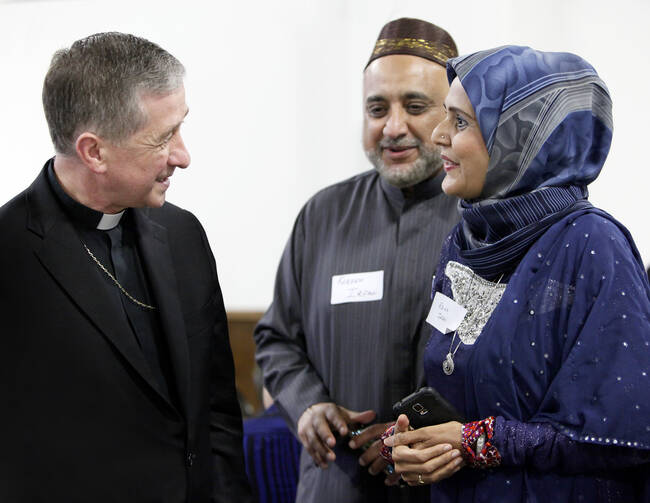Fewer than two in 10 U.S. Catholics hold a favorable view of Muslims, and many have little understanding of the world’s second largest religion. When asked, “What is your overall impression of Muslims?” 30 percent of those Catholics polled said they held unfavorable views, 14 percent said favorable, and 45 percent said they held neither favorable nor unfavorable views.
That is according to a report released on Sept. 12 by Georgetown University’s The Bridge Initiative, a program at the Washington, D.C., Jesuit university aimed at improving public understanding of Islam while tracking the public discourse on Islam and Muslim life.
“We hope Catholic educators, catechists and clergy can use this report as a starting point to ask, ‘What do Catholics know; what do Catholics not know; and what do we need to be communicating?’” Jordan Denari Duffner, the author of the report, told America.
The survey also asked about religion and violence. Forty-five percent of Catholics said that Islam encourages violence more than other religions, while 24 percent said it encourages violence as much as other religions. About four in 10 U.S. Catholics agree that “Muslims have sufficiently condemned acts of terrorism committed in the name of Islam” while another four in 10 disagree.
Catholics in the United States are not sure about what they share in terms of religious belief with the world’s 1.6 billion Muslims. About a third of all U.S. Catholics (32 percent) believe that Catholics and Muslims worship the same God, while 42 percent say they do not. About a quarter are unsure.
In Vatican II’s “Declaration on the Relationship of the Church to Non-Christian Religions,” the church affirms that the three Abrahamic faiths—Judaism, Christianity and Islam—all worship the same God. But as the report shows, this teaching is still not fully understood or accepted by all believers.
The report notes that St. John Paul II reiterated Catholic teaching about the three monotheistic faiths worshiping the same God in a 1985 speech to Muslim youth in Morocco in 1985. He said then, “We believe in the same God, the one God, the living God, the God who created the world.”
Denari Duffner noted that Pope Francis often portrays Islam in a positive light, which has affected how the Catholic press in the United States represents Islam. “The way our religious leaders talk about Islam is often the way people learn about Islam,” she said.
Most Catholics understood that key components of Islam include daily prayer (93 percent) and fasting (77 percent) and knew that Muslims do not believe in the Trinity. But 86 percent of Catholics thought incorrectly that Muslims worship Muhammad.
When it comes to Jesus, 74 percent of Catholics said Muslims do not hold Jesus in high regard and 88 percent said they do not honor Mary. In fact, Muslims believe Jesus is a revered prophet and that Mary is his virgin mother.
Nearly half of U.S. Catholics, 44 percent, said either that they did not know of any similarities between the two faiths or that they believed there were none at all.







